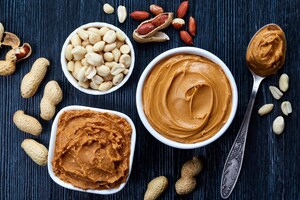
ALBANY, Ga., Jan. 6, 2020 /PRNewswire/ -- When it comes to health and wellness, it's OK to start small. In fact, a good health reset is often most successful when smart, small, sustainable changes are made.
Dr. Samara Sterling, research director with The Peanut Institute, says it's best to begin by focusing on increasing good habits.
"Set yourself up for success by building on the healthy habits you already have," says Sterling. "For example, if you typically eat one serving of fruit a day, identify a way to increase that to two servings."
Another smart move is to incorporate foods that are high in protein and fiber in order to feel full longer.
Peanuts are an example of a powerful plant protein. Just one serving of peanuts delivers seven grams of protein, 19 vitamins and minerals, fiber and heart-healthy fats.
"Studies have shown that protein is the most filling macronutrient and actually changes the levels of several satiety hormones," says Sterling. "When you have foods like peanuts and peanut butter that deliver plant protein, fiber and healthy fats, you're making a smart choice that will keep you feeling full, help power you through the day and eliminate the urge to snack and consume empty calories," explains Sterling.
Peanuts are known as a superfood because they deliver significant nutritional value in a small amount. One serving of peanuts is an ounce or approximately 35 peanuts and a serving of peanut butter is two tablespoons.
"Research has shown that the consumption of small amounts of peanuts or peanut butter has been associated with a reduced risk of cancer, heart disease and diabetes," says Sterling. "Since peanuts and peanut butter are affordable, it's easy to incorporate either one into a meal or snack."
For even more health benefits, Dr. Sterling recommends combining superfoods.
"Having a kale salad mixed with quinoa and peanuts is a smart way to load up on vitamins and minerals," says Sterling.
Finally, as part of a good health reset, Dr. Sterling advises following an inclusionary approach because it's more sustainable than an exclusionary one.
"Once people start excluding foods, they tend to fixate on what they can't have, which can lead to a relapse of the previous bad habits," says Sterling. "A more positive and realistic way is to focus on making smart choices like including more fruits, vegetables and legumes."
Despite their name, peanuts are actually a legume, which is a type of vegetable. Peanuts, lentils, peas and beans are all legumes and are healthy, protein-rich substitutes for meat, which has more fat and cholesterol.
"The more you know about your food choices and the health benefits they deliver, the easier it becomes to implement a good health reset," says Dr. Sterling. "Each week, make it a point to try a new recipe that incorporates a plant-based protein. In just a few months, you'll have a number of go-to recipes that are based on a healthy choice."
For breakfast, lunch, dinner, dessert and snack recipes that incorporate peanuts, peanut butter, peanut flour and peanut oil, visit peanutinstitute.com.
Dr. Samara Sterling is a Nutrition Scientist with expertise in the use of plant-based nutrition for the prevention and treatment of chronic diseases. She currently serves as the Research Director for The Peanut Institute and has also worked as a nutrition consultant for various community-based nutrition projects. She holds a bachelor's degree from Stony Brook University, a master's degree from Andrews University and a Ph.D. from the University of Alabama at Birmingham.
Based in Albany, Ga., The Peanut Institute is a non-profit organization supporting nutrition research and developing educational programs to encourage healthful lifestyles that include peanuts and peanut products. The Peanut Institute pursues its mission through research programs, educational initiatives and the promotion of healthful lifestyles to consumers of all ages. As an independent forum, The Peanut Institute is uniquely positioned to work with all segments of the food industry, the research community, academia, consumer organizations and governmental institutions.
SOURCE The Peanut Institute








Share this article